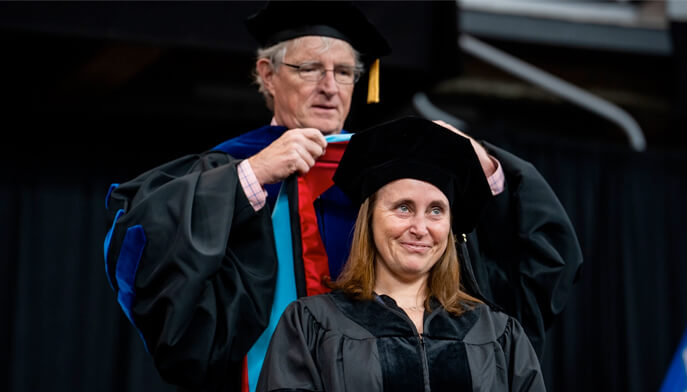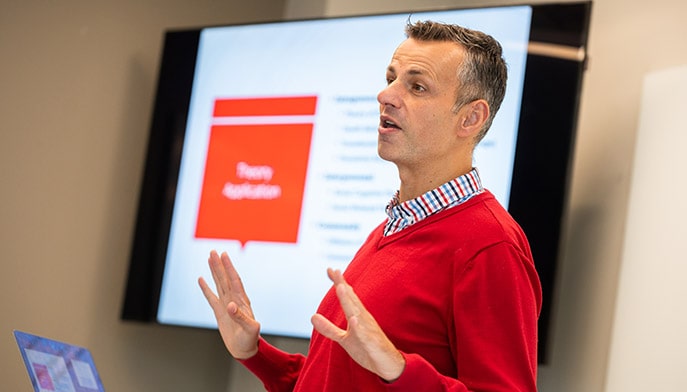Many people are drawn to therapy not just as a profession, but as a calling—one rooted in empathy, curiosity, and a desire to understand human connection.
If that resonates with you, then pursuing a graduate degree in Marriage and Family Therapy (MFT) will likely shape you in more ways than one.
This isn’t just a program to prepare you for licensure. It’s an experience that deepens how you listen, communicate, relate, and show up in the world. The skills you’ll develop go far beyond the therapy room—they influence your relationships, your self-awareness, and your overall presence. “MFTs are systemic therapists. So, therapy isn’t something you just learn to do. A therapist is something you must become,” says Fairfield University MFT Program Director Michele Parker, PhD.
Here are some of the essential interpersonal skills and clinical experience you’ll build during an MFT program and will continue to hone once you are a licensed marriage and family therapy practitioner.
It’s a good idea to review the curriculum of the MFT Programs you are considering to determine how the training addresses these core skills needed to be a therapist.
Active Listening and Empathic Presence
At the heart of therapy is the ability to truly listen—without interruption, without judgment, and without rushing to fix. In an MFT program, you’ll learn how to tune in not just to what someone is saying, but to how they’re saying it. Tone, body language, and silence can speak volumes. Your clients will respond better when you bring eye contact, active listening, and empathy to your therapy sessions.
You’ll also learn to sit with others’ emotions without becoming overwhelmed or distant—a skill that develops over time through clinical training, supervision, and reflection. Many MFTs share that the skills they developed in training helped them become a more attentive partner, friend, and colleague.
Developing Emotional Intelligence
Emotional intelligence isn’t just something you teach others or build into your treatment plan—it’s something you strengthen in yourself. As you learn how to help clients understand their emotional patterns, you’ll become more attuned to your own.
MFT students and grow in:
- Self-awareness: recognizing your emotional triggers and blind spots
- Self-regulation: staying grounded when sessions become emotionally intense
- Empathy: understanding emotions from a client’s perspective
- Motivation & reflection: noticing your own growth areas and leaning into them
- Social awareness: reading relational family dynamics and group dynamics
This emotional literacy becomes a foundation for your clinical judgment—and your personal growth.
Understanding the Academic Background
While empathy and strong interpersonal skills are important in marriage and family therapy (MFT), they are not enough on their own. A core skill developed in MFT programs is the ability to understand and apply complex theoretical frameworks and research-based strategies. Many people are drawn to the field because they’re good listeners or have a natural inclination to help others, but the work of a therapist is deeply grounded in academic study.
Students in MFT programs learn to navigate a wide range of psychological theories—such as systems theory, attachment theory, cognitive-behavioral approaches, and narrative therapy—and to evaluate their effectiveness in different therapeutic contexts. They also gain fluency in interpreting peer-reviewed research, understanding evidence-based practices, and applying clinical findings to real-world scenarios. This academic foundation ensures that therapy is not simply intuitive or conversational, but deliberate, ethical, and grounded in best practices. Ultimately, understanding the academic background empowers therapists to offer interventions that are not only compassionate, but also scientifically informed and effective.
Mastering the Art of Therapeutic Communication
Communication in therapy is not one-size-fits-all. You'll learn how to adapt your tone, language, and approach to meet each client’s unique needs—whether you're speaking to a distressed couple, a withdrawn teen, someone managing mental illness or substance abuse, or a high-conflict family system. You will also need to work with multiple clients’ comunicataion styles—often in the same session. Learning effective communication in clinical settings is essential for all mental health professionals.
Therapeutic communication involves:
- Asking open-ended questions
- Validating and affirming client experiences
- Using silence intentionally
- Offering reframes that shift perspective
- Holding space without rushing toward solutions
These are subtle, powerful therapist communication skills—and you’ll practice them again and again throughout your clinical training.
View Fairfield’s MFT course descriptions overview and browse the master’s degree in MFT course requirements for details about the MFT graduate program skills you will study at Fairfield.
Systemic Thinking and Relational Awareness
One of the most transformative aspects of MFT training is learning how to “zoom out.”
Rather than focusing solely on individual symptoms, you’ll be trained to view challenges through a systemic lens—understanding how family systems, cultural contexts, and social systems interact.
You’ll develop the ability to:
- Spot recurring relational patterns
- Identify unspoken roles within families
- Understand how systems perpetuate certain behaviors
- Help clients reframe their stories within a broader context
These insights can change how you interpret conflict in your own life, too—bringing nuance, empathy, and a broader sense of perspective.
Personal Growth Through the MFT Journey
Perhaps the most unexpected skill you’ll gain as a marriage and family therapist is presence: the ability to show up authentically, compassionately, and without needing to “fix” everything.
Many MFT students describe the program as life changing. You’ll likely grow in:
- Self-compassion: learning to be as kind to yourself as you are to clients
- Resilience: holding emotional complexity without shutting down
- Patience: understanding that growth is nonlinear—for clients and yourself
- Clarity: seeing your personal values and boundaries more clearly
These skills needed for marriage and family therapists are not items on a syllabus—but they’re just as real as any clinical skill. And they stay with you long after graduation.
Read about how MFT alumna Brianna Padwes ’22 navigated her journey in family therapy.
More Than a Degree
The skills you develop in an MFT program aren’t just professional tools. They change how you relate to the world, how you understand others, and how you see yourself.
If you’re called to this work because you want to support others—and grow along the way—then these core skills are the start of something deeper. Something lasting.
Fairfield University’s Marriage and Family Therapy program is designed to support both your clinical training and your personal development, with a curriculum rooted in reflection, diversity, and systemic thinking.
Learn more about Fairfield’s MFT program and how it prepares you for meaningful work.




